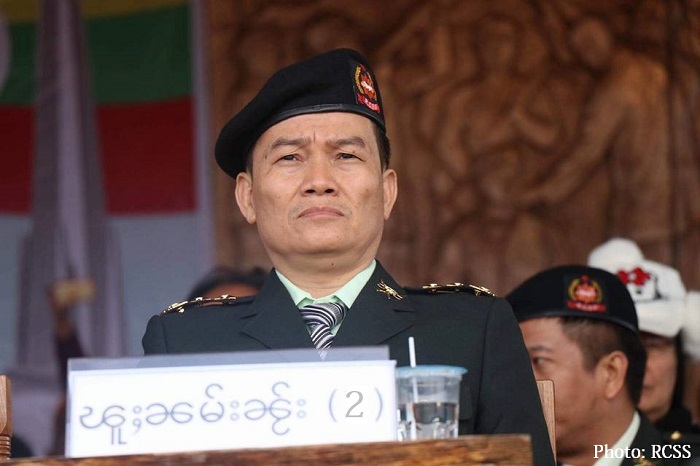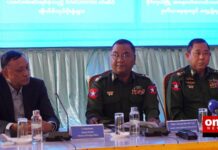SHAN speaks with an RCSS/SSA spokesperson about the Burma Army’s recent orders and directives for ethnic armed organizations.

In a second interview with Restoration Council of Shan State/Shan State Army (RCSS/SSA) Secretary (2) and spokesperson Col. Sai Nguen, SHAN discusses a recent Burma Army statement ordering all ethnic armed organizations (EAOs) to withdraw to their headquarters. In the case of the RCSS/SSA, this would be Loi Tai Leng on the Thai-Burma border. The demand was published on January 25 with a deadline of February 12.
What is your impression of the Tatmadaw’s recent statements?
Every organization releases statements if it is needed. It’s a normal process. The major things to consider are why and for what reason, the issue, timing, and region. If some facts and issues in the statement cause suffering for other organization, it means the statement creates problems.
The Burma Army accused EAOs of violating another order released in December, in which it declared a four-month ceasefire. This would mean you have violated the Nationwide Ceasfire Agreement [NCA]. What’s your opinion on and response to this?
We already said that we welcome their statement released on December 21. The Tatmadaw expressed their opinion. It’s really difficult for EAOs to follow all of their orders and directives. We are dialogue partners. We are completely different organizations. We don’t know if these facts are true, reliable, or accurate. We have investigated all ranking members—we can say that we won’t break the NCA. Their accusations are not true. Up through today, we haven’t violated the NCA.
The Burma Army ordered all EAOs including the RCSS to withdraw to its designated area before February 12. What is your response to this?
For our organization, it’s not convenient for us to [withdraw]. We have different opinions and different views on the Union-level ceasefire agreement signed in Kengtung. Until now, we have been unable to negotiate around this issue. The area mentioned in the Union-level ceasefire agreement is for our headquarters, where about 500 soldiers can be deployed. We understand that the territory mentioned in the NCA is only for the headquarters—it’s not for all of our soldiers. On the other hand, the Tatmadaw sees our headquarters area as being for all of our soldiers. We haven’t yet solved this demarcation problem. We cannot demarcate controlled-territory for our headquarters area and the area where our soldiers are deployed. That’s why the Tatmadaw has accused us for ‘invading territory’ because we cannot solve the demarcation problem. To solve this problem, we need meetings for separate discussions with the Tatmadaw.
The Burma Army urged EAOs to negotiate within the peace process as soon as possible. What’s your take on this?
After the Burma Army released the [December] statement, EAOs and the Peace Commission (PC), the NRPC [National Reconciliation and Peace Center] and the Tatmdaw’s negotiation team met in both Thailand and China. For our RCSS, we held an informal meeting with the PC in Thailand on January 14. We got positive results from the informal meeting. Therefore, we will have a meeting with the NRPC and Tatmadaw soon. We already sent an official letter on January 22 about a negotiation meeting schedule. But the Burma Army released a unilateral warning statement on January 25 about the ceasefire and long lasting peace. As a consequence, we have to review the planned meeting. We have to wait and see whether the planned meeting will take place. We are also waiting to hear the opinions of other EAOs.
Regarding to Tatmadaw’s warning statement, what is your response, in summary?
For EAOs, we really want peace more than other people. We cannot resolve 70-year-old political problems and a civil war in a short time. We have to take time. We need to be patient. We need to build mutual trust. We need to be honest. We need to have mutual respect. We need to recognize each other. We need to have empathy. We must respect the common goal. We must be committed to a win-win solution. If we can work with a true commitment and honesty, peace will be restored in the country. People will benefit from peace. I do believe that eventually, we can build a true federal democratic Union.
Sometimes, the peace process is very sensitive. At this crucial time, if ultimatums and accusations—without any proof—are released, the impact will cause the peace process to move backward. This should not be done among dialogue partners. They should take care of themselves. They should respect other organizations. If they don’t, peace will be far away even though it’s very close. I am worried that it will be gone like water when it is thrown into the sand.











Leave a Comments